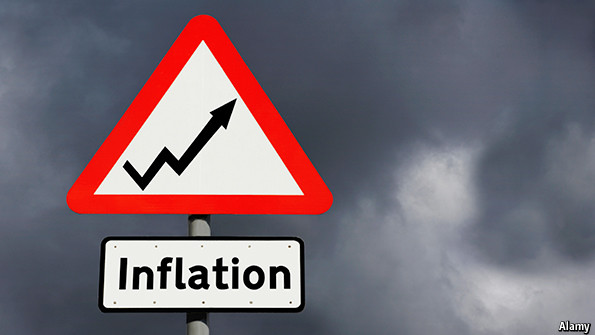Das Liberale Institut aus Zürich hat ein neues Paper veröffentlicht, geschrieben von KARL-FRIEDRICH ISRAEL (ist promovierter Ökonom sowie Forscher/Professor an den Universitäten Berlin, Leipzig und Angers, https://www.wifa.uni-leipzig.de/iwp/team/israel0.html; https://kfisite.files.wordpress.com/2020/02/karl-f-israel-cv.pdf):
https://www.libinst.ch/publikationen/LI-Paper-Israel-Erklaerungsluecke-Inflation.pdf

Zusammenfassung
- Viele Ökonomen haben in den letzten Wochen vor potenziell sehr hohen Preisinflationsraten gewarnt, mit der Begründung, dass eine Geldexpansion von ungeahntem Umfang auf einen negativen Angebotsschock treffe. Andere befürchten hingegen, dass die monetären und fiskalischen Stimuli nicht stark genug sein werden, um den Rückgang der privaten Ausgaben zu kompensieren. Dadurch könnte eine Deflationsspirale in Gang gesetzt werden. In den meisten Fällen irren sich zum Glück beide Seiten.
- Betrachtet man die Verbraucherpreisinflationsraten in der Eurozone, dann hat die eher aktionsfreudige Geldpolitik der letzten Jahrzehnte wenig Wirkung gezeigt: Die Geldmenge M1 ist der Eurozone im Zeitraum von 1999-2020 mit einer durchschnittlichen Jahresrate von 7,59% gewachsen. Damit hat sie sich weit mehr als vervierfacht, während die Verbraucherpreise nur um etwas mehr als 40% gestiegen sind.
- Subtrahiert man sowohl die durchschnittliche reale Wachstumsrate, als auch die durchschnittliche Verbraucherpreisinflationsrate von der durchschnittlichen Wachstumsrate der Geldmenge M1; dann verbleibt eine Erklärungslücke von etwa 4,6 Prozentpunkten pro Jahr. Wohin fliesst das Geld, wenn es nicht durch höhere Stückpreise für Konsumgüter oder eine grössere reale Produktion absorbiert wird?
- Der Inflationsdruck entlädt sich ausserhalb der Konsumgütermärkte, vor allem auf den Märkten für langfristige Vermögenswerte wie Aktien und Immobilien. Die offizielle Inflationsmessung unterschätzt die allgemeine Preisinflationsrate, was für den durchschnittlichen Haushalt nicht unbedeutend ist: Wenn die Vermögenspreise steigen, wird es schwieriger, ein bestimmtes Niveau an Realvermögen zu erreichen. Die Preisinflation findet für die meisten Menschen zwar ausserhalb der offiziellen Zahlen aber dennoch deutlich spürbar statt.
Disclaimer: Der Text ist nicht von mir, sondern vom Liberalen Institut. Sobald das Liberale Institut (oder der Autor des Textes) einen Account bei Hive hat, sende ich die Rewards für diesen Post (grosszügig aufgerundet) zu dessen Account.

summary in English
- In the past few weeks, many economists have warned of potentially very high price inflation rates, on the grounds that an unprecedented expansion of money will encounter a negative supply shock. Others fear that monetary and fiscal stimuli will not be strong enough to compensate for the decline in private spending. This could start a deflationary spiral. Fortunately, in most cases, both sides are wrong.
- Looking at consumer price inflation rates in the eurozone, the more proactive monetary policy of the past few decades has shown little effect: The M1 money supply grew in the eurozone between 1999 and 2020 with an average annual rate of 7.59%. It has more than quadrupled, while consumer prices have only increased by a little over 40%.
- Subtracting both the average real growth rate and the average consumer price inflation rate from the average growth rate of the money supply M1; then there is an explanation gap of about 4.6 percentage points per year. Where does the money go if it is not absorbed by higher unit prices for consumer goods or larger real production?
- Inflationary pressures discharge outside of the consumer goods markets, especially in the markets for long-term assets such as stocks and real estate. The official inflation measurement underestimates the general price inflation rate, which is not insignificant for the average household: when asset prices rise, it becomes more difficult to reach a certain level of real wealth. For most people, price inflation takes place outside the official figures, but is still clearly noticeable.
Disclaimer: This text is not from me, but from the Liberales Institut (a classical liberal think tank). As soon as Liberales Institut (or the author of the text) has an account with Hive, I will send the rewards for this post (generously rounded up) to its account.
A lot of economics right here. My only fear is the incoming global recession. I fear for the feds as china is doing a lot by also dumping their treasury bills
Yes, I also think that a global recession is ahead.
But I don't think China is able to dump their treasury bills, because the solvency of China depends on these treasury bills. Without them China's credit bubble will burst.
But i think they dumped a certain percentage this period.
This is the way most people experience the "wealth gap"--a decline in economic mobility. Stagnation possibly explains the rise of so-called 'populist' movements. Those stuck on the lower rungs of the economic ladder see no way up and seek unconventional solutions to their difficulty.
I'm no economist, and don't even understand economics very well, but your line struck me: "it becomes more difficult to reach a certain level of wealth".
To some people it seems not more difficult, but impossible.
Yes, unfortunately. And I think this impossibility "to reach a certain level of wealth" contributes to the discontent of many people adding fuel to the fire of Black Lives matter in the US and the Yellow Vest Movement in Europe.
Congratulations @zuerich! You have completed the following achievement on the Hive blockchain and have been rewarded with new badge(s) :
You can view your badges on your board And compare to others on the Ranking
If you no longer want to receive notifications, reply to this comment with the word
STOPTo support your work, I also upvoted your post!
Support the HiveBuzz project. Vote for our proposal!
Great analysis bringing the light on the inflation and how it is affecting our earning and economies in this harsh days.